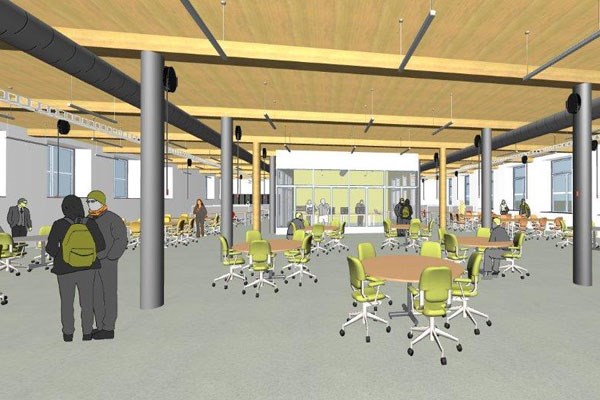Former Bookstore Re-engineered for Hands-on Learning

03/13/2015
By David Perry
What do you do with an old book store? Re-make it for makers.
What was once a North Campus bookstore will soon become a honeycomb of student activity and a lure for future UMass Lowell engineering students.
“This is transformative,” says Joseph Hartman, dean of the Francis College of Engineering, of the Maker Space that is taking shape in the basement of Falmouth Hall.
The still-unnamed maker space replaces the North Campus bookstore, which relocated to the new (http://www.uml.edu/bookstore) River Hawk Shop on the first floor of University Crossing. Unrecognizable as its previous incarnation, the Falmouth ceilings have been peeled down, walls pulled back.
The space will hold eight 3D printers and workstations for electronics and machining. There’s room for 100 students at a time, says Hartman, and it will be available to students 24 hours a day.
In the 8,500-square-foot space, concepts will come to life.
It’s the thing the folks in the engineering department -- faculty and students alike -- have been waiting for, says one faculty member.
“This is really about making things real,” says plastics engineering Prof. David Kazmer. “All the time, students learn equations and math and how to do things. This maker space will let students at all levels realize their ideas.”
Kazmer says students interacting and applying concepts learned in classes creates enthusiasm, and “closes the loop on the educational experience, making it real.”
Hartman and Kazmer both envision a space that will hum with the trial and error of students testing out ideas. Working in teams or individually, students will be able to build prototypes.
The Maker Space trend, which parallels a renewed interest in manufacturing in the U.S., has become a hot item and a lure to prospective students, notes Hartman.
“Imagine being able to take prospective students to this hub of engineering activity,” he said.
The space will also be open to other university departments, says Hartman, and it dovetails with the university’s growing DifferenceMakers effort.
“The Engineering maker space will support UMass Lowell DifferenceMakers as they invent new solutions and new products for the 21st century,” says Steven Tello, associate vice chancellor for Entrepreneurship & Economic Development. “This space reflects the College of Engineering’s commitment to integrating innovation and entrepreneurship into the engineering curriculum. The university is a national leader in this regard, developing programs like DifferenceMaker and facilities like the maker space that will encourage and support entrepreneurial learning and initiatives among our students for generations to come.”
Hartman knows he will field requests for work space once people see the vast room.
“Absolutely. I’ve already had someone from art ask about using space for sculpture,” says Hartman. “And I said, we can work something out, just don’t expect it to be quiet. It’s a working space.”
